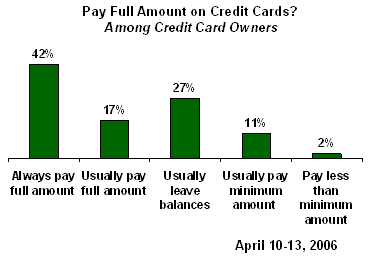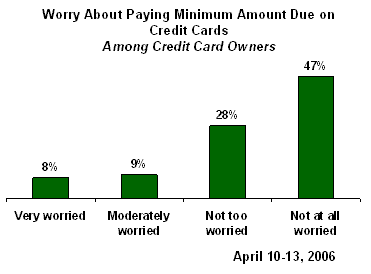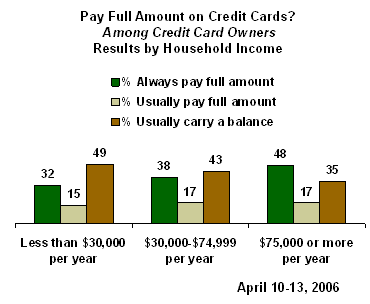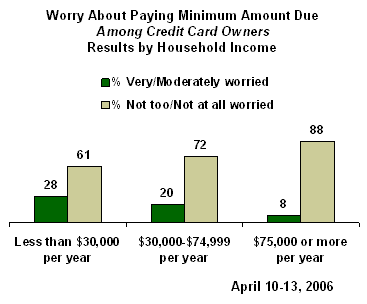GALLUP NEWS SERVICE
PRINCETON, NJ -- Gallup's annual survey on personal finances finds Americans reporting that they have, on average, three credit cards. Only about 4 in 10 credit card owners say they always pay their credit card balances in full each month, while almost an equal percentage say they tend to carry a balance on their credit cards. On average, credit card owners estimate they owe more than $3,000 that they do not intend to pay off each month. Household income is significantly related to Americans' reported credit card habits.
Overall Results
The poll, conducted April 10-13, finds that Americans have an average of 2.9 credit cards, including cards for any department stores, retail chains, and general bank credit cards such as Visa or MasterCard. This includes 20% of Americans who do not have any credit cards, 35% who have one or two credit cards, 23% who have three or four, and 19% who have five or more.
|
Number of Credit Cards Americans Own |
|
|
Apr 10-13, 2006 |
|
|
% |
|
|
None |
20 |
|
One to two |
35 |
|
Three to four |
23 |
|
Five to six |
11 |
|
Seven or more |
8 |
|
No opinion |
2 |
|
|
|
|
Mean |
2.9 |
Forty-two percent of credit cards owners report they always pay the full amount on their credit cards each month, while an additional 17% say they usually do so. Forty percent of Americans report that they tend to carry a balance, including 27% who say they always pay as much as they can, but usually leave balances on their cards, 11% who say they usually pay the minimum amount due, but not much more, and 2% who say they sometimes pay less than the minimum due.

On average, credit card owners estimate that they have a balance of $3,426 that they do not intend to pay off each month. This includes 40% who say they owe nothing, 17% who owe up to $1,000, 20% who owe between $1,000 and $5,000, and 16% who owe more than $5,000 on their cards. Among those who have a balance on their credit cards, the average amount owed is higher, at $5,960. The average estimated amount of money owed by all Americans is much lower, at $2,684, because 20% of Americans say they do not have any credit cards.
|
Monthly Credit Card Balance |
||
|
Credit card |
|
|
|
% |
% |
|
|
None/Do not own credit card |
-- |
20 |
|
None/Own credit card |
40 |
31 |
|
$500 or less |
10 |
8 |
|
$501 to $1,000 |
7 |
6 |
|
$1,001 to $2,000 |
8 |
6 |
|
$2,001 to $5,000 |
12 |
10 |
|
$5,001 to $10,000 |
9 |
7 |
|
More than $10,000 |
7 |
5 |
|
No opinion |
6 |
7 |
|
|
|
|
|
Mean (including zero) |
$3,426 |
$2,684 |
While a majority of credit card owners report carrying a balance, relatively few are worried about not making the minimum payment. Seventeen percent of all credit card owners say they are "very" (8%) or "somewhat" (9%) worried about not being able to make the minimum payments. Seventy-five percent say they are "not too" (28%) or "not at all" (47%) worried.

Higher- vs. Lower-Income Households
Household income is significantly related to Americans' reported credit card habits, as would be expected. Higher-income earners are more likely than lower-income earners to have a greater number of credit cards, to report paying off their balances in full each month, and to carry a larger balance each month. Higher-income earners also express less concern about paying their minimum payments than do lower-income earners.
Forty percent of Americans who earn less than $30,000 per year say they do not have any credit cards, compared with 16% of those who earn between $30,000 and $75,000 per year and just 2% of those who earn $75,000 or more per year. On average, those in the lower-income group own 1.7 credit cards, those in the middle-income group own 2.9, and those in the higher-income group own 4.2.
|
Number of Credit Cards Americans Own, |
|||
|
Less |
|
$75,000 |
|
|
% |
% |
% |
|
|
None |
40 |
16 |
2 |
|
One to two |
38 |
36 |
32 |
|
Three to four |
11 |
27 |
31 |
|
Five to six |
6 |
11 |
19 |
|
Seven or more |
4 |
8 |
14 |
|
No opinion |
2 |
1 |
1 |
|
|
|
|
|
|
Mean |
1.7 |
2.9 |
4.2 |
Only about a third of credit card owners in the lower-income group (32%) say they always pay their full balance on their credit cards each month. This percentage is higher for those earning more money, at 38% for those in the middle-income category and at 48% among those in the higher-income category.

On average, credit card owners in the lower-income category carry a balance of $2,232 that they do not intend to pay off each month. Perhaps not surprisingly, because those with higher incomes have more money available to spend, this average is higher among credit card owners in the middle-income group, at $3,338, and among those in the higher-income group, at $4,489. Still, it is interesting to note that those in the higher-income group are slightly more likely to report owing nothing.
|
Monthly Credit Card Balance |
|||
|
Less |
|
$75,000 |
|
|
% |
% |
% |
|
|
None |
37 |
35 |
45 |
|
$500 or less |
20 |
10 |
6 |
|
$501 to $1,000 |
7 |
10 |
4 |
|
$1,001 to $2,000 |
13 |
6 |
7 |
|
$2,001 to $5,000 |
7 |
15 |
14 |
|
$5,001 to $10,000 |
5 |
11 |
10 |
|
More than $10,000 |
3 |
8 |
9 |
|
No opinion |
10 |
5 |
4 |
|
|
|
|
|
|
Mean |
$2,232 |
$3,338 |
$4,489 |
Credit card owners in the lower-income group also express a higher level of concern about paying the minimum amount owed on their credit cards each month, though it is important to note a majority of credit card owners in all income categories say they are not that worried about making their minimum payments. Twenty-eight percent of credit card owners in the lower-income group say they are at least moderately worried about paying the minimum balance on their credit cards. This percentage is lower among those earning more money, at 20% among those in the middle-income group and at 8% among those in the higher-income group.

Survey Methods
Results are based on telephone interviews with 1,005 national adults, aged 18 and older, conducted April 10-13, 2006. For results based on the total sample of national adults, one can say with 95% confidence that the margin of sampling error is ±3 percentage points.
For results based on the sample of 820 credit card owners, the maximum margin of sampling error is ±4 percentage points.
In addition to sampling error, question wording and practical difficulties in conducting surveys can introduce error or bias into the findings of public opinion polls.
